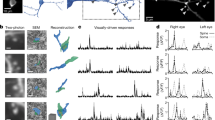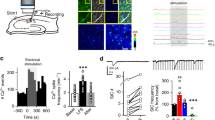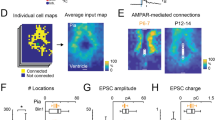Abstract
ONE class of excitatory amino-acid receptors, the N-methyl-D-aspartate (NMDA) receptors, mediates transmission at a small, but important, group of synapses in the neocortex1–3. These receptors are implicated in neuronal plasticity during development in young mammals and in memory acquisition in adults4–6. Recently, responses of isolated membrane patches to NMDA were shown to be greatly enhanced by glycine7. This, together with the demonstration that the strychnine-insensitive glycine-binding site is distinct from, but linked to, the NMDA receptor8 has excited intense interest in glycine as a synaptic modulator. Before proposing a physiological function, however, it is important to determine whether glycine could enhance synaptic responses to NMDA receptor activation in intact, adult tissue. An earlier study9 failed to demonstrate enhancement of NMDA responses when glycine was applied and it was proposed that in intact tissue the high-affinity glycine site was already saturated by endogenous glycine. It remained possible that glycine concentrations can be maintained at low levels close to synaptic receptors. We have examined responses of neurons in slices of adult neocortex to focal applications of excitatory amino acids and glycine and report enhancement by glycine of NMDA receptor-mediated excitatory postsynaptic potentials.
This is a preview of subscription content, access via your institution
Access options
Subscribe to this journal
Receive 51 print issues and online access
$199.00 per year
only $3.90 per issue
Buy this article
- Purchase on Springer Link
- Instant access to full article PDF
Prices may be subject to local taxes which are calculated during checkout
Similar content being viewed by others
References
Thomson, A. M., West, D. C. & Lodge, D. Nature 313, 479–481 (1985).
Thomson, A. M. J. Physiol. 370, 531–549 (1986).
Thomson, A. M., Girdlestone, D. & West, D. C. B. J. Pharmac. 96, 406–408 (1989).
Rauscheker, J. P. & Hahn, S. Nature 326, 183–185 (1987).
Artola, A. & Singer, W. Nature 330, 649–652 (1987).
Morris, R. G. M., Anderson, E., Lynch, G. S. & Baudry, M. Nature 319, 774–776 (1986).
Johnson, J. W. & Ascher, P. Nature 325, 529–531 (1987).
Bonhaus, D. W. & McNamara, J. O. Molec. Pharmac. 34, 250–255 (1988).
Fletcher, E. J. & Lodge, D. Eur. J. Pharmac. 151, 161–162 (1988).
Kessler, M., Baudry, M., Terramani, T. & Lynch, G. Soc. Neurosci. Abs. 13, 760 (1987).
Araki, T. et al. Neurosci. 25, 613–624 (1988).
Forsythe, I. D. & Westbrook, G. L. J. Physiol. 396, 515–533 (1988).
Author information
Authors and Affiliations
Rights and permissions
About this article
Cite this article
Thomson, A., Walker, V. & Flynn, D. Glycine enhances NMDA-receptor mediated synaptic potentials in neocortical slices. Nature 338, 422–424 (1989). https://doi.org/10.1038/338422a0
Received:
Accepted:
Issue Date:
DOI: https://doi.org/10.1038/338422a0
Comments
By submitting a comment you agree to abide by our Terms and Community Guidelines. If you find something abusive or that does not comply with our terms or guidelines please flag it as inappropriate.



